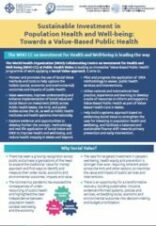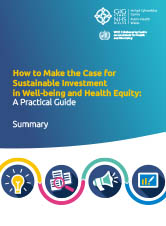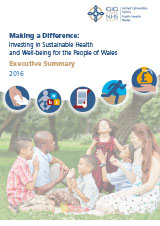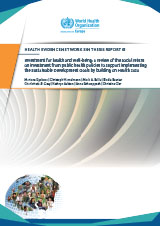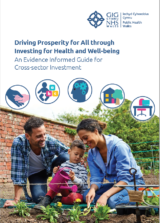Making the case for investing in prevention and public health by collectively illustrating the social, economic and environmental value of public health programmes is imperative to taking forward both national and international commitments, to enable sustainable and fair policy and action for all. As we move into the recovery phase from COVID-19, it is important action is targeted to maximise the value of service and interventions. Incorporating social, economic and environmental outcomes into the decision-making process will ensure this is achieved by building an ‘Economy of Well-being’; a type of recovery that places health and well-being, social, economic and environmental co-benefits of investment across sectors as vital to rebuilding our economy and society.
The need for investment in health and well-being to achieve sustainable development and inclusive economic growth is stronger than ever in the face of multiple challenges and adversities. This is of particular importance as we respond and recover from the current COVID-19 pandemic. The pandemic has highlighted, and contributed to, increasing inequalities across communities, society and our planet, whilst also creating new vulnerabilities. It has also brought to light the negative consequences of under-investment in health and well-being, and has shown clear independencies between investment in public health, not exclusive to health protection, and the wider economy.
For more information on our Sustainable Investment work see below:
Social Value Database and Simulator for Public Health
The Social Value Database and Simulator (SVDS) for Public Health has been developed by the World Health Organization (WHO) Collaborating Centre on Investment for Health and Well-being (WHO CC) at Public Health Wales. This is part of a pioneering programme of work and a wider organisational and global drive towards increasing Value and Impact, applying a Social Value approach towards building a ‘Value-Based Public Health’ and an Economy of Wellbeing in Wales and beyond.
This is an innovative tool for collation,storage and manipulation of health economics evidence, currently focusing on the Social Return on Investment (SROI) methodology and its application to public health. It can be used to capture, quantify, measure and model the Social Value (SROI) of public health programmes, assessing their wider social, economic and environmental outcomes.
The SVDS for public health has two main functions:
1) Database, storing available and relevant SROI economic evidence, which will be continuously updated and expanded over time*; and
2) Modelling tool (simulator) to allow manipulation of economic and public health data to simulate public health services and interventions and model SROI estimates, relevant to the national, local, organisational, and programme context and population. This will be a service provided by the WHO CC to walk you through the process and support with interpretation as part of this function.
The tool has been informed by and developed in collaboration with experts in Social Value and SROI; researchers and health economists; and colleagues across Public Health Wales, the NHS and the Welsh Government. It can provide essential information to help inform public health and wider decision-making, investment prioritisation and programme improvement in order to maximise value for money and support a more sustainable and resilient NHS and economy in Wales, placing population health and wellbeing at its heart.
The SVDS is aimed at colleagues in Public Health Wales, as well as relevant external (national and international) stakeholders and partners, working or interested in the areas of health financing, economic evaluation, Social Value and SROI, Value-Based Health Care, public health modelling, investment in health and wellbeing, sustainable economic development, (public) health system strengthening, etc. A detailed User Guide has been developed; and further workshops and training will be organised to increase awareness, support utilisation and promote application in public health.
The SVDS for public health is available here: https://svdspublichealth.methods.co.uk/ and you can request access by emailing: [email protected] to register and receive log in details (please make sure to check your junk folder).
Do you know of SROI evidence which could be added to the SVDS for Public Health? We are always looking for SROI studies to be added to the database. If you are aware of any work you would like us to add, email us at [email protected].
*All SROI studies included in the database have been quality assessed using Krlev et al’s 12-point quality assessment framework, with quality scores indicated.
A Social Value approach towards building a Value-Based Public Health
The World Health Organization (WHO) Collaborating Centre on Investment for Health and Well-being (WHO CC) at Public Health Wales is progressing a pioneering programme of work, applying a Social Value approach towards building a ‘Value-Based Public Health’ and an Economy of Wellbeing in Wales.
Our work aims to:
- Pioneer and promote the use of Social Value methods and tools to help capture the holistic (social, economic and environmental) outcomes and impacts of public health.
- Pilot and progress the application of Social Return on Investment (SROI) methodology to assess public health services and interventions.
- Raise awareness, improve understanding and enhance implementation of Social Value and SROI across Public Health Wales, the NHS, and public bodies across the UK, as well as Public Health Institutes and health systems internationally.
- Utilise national and international best practice, experience and learning to develop a suite of resources to inform and support a Value-Based Public Health as part of Value-Based Health Care in Wales.
- Help build a systems approach based on evidencing Social Value to strengthen the case for investing in population health and wellbeing, and facilitate a balanced and sustainable finance shift towards primary prevention and early intervention.
- Explore evidence and opportunities to develop further the concept, methodology and real life application of Social Value and SROI to improve health and well-being, and reduce health inequity in Wales and beyond.
The WHO CC is creating a diverse and innovative portfolio of products and tools to support the case for sustainable, evidence and value based investment in public health and health equity.
You can learn more about our work from the Sustainable Investment in Population Health and Well-being: Towards a Value-Based Public Health brochure, which provides an outline of key concepts, examples of application, and a suit of resources to support colleagues, stakeholders and partners to progress this agenda.
For more information, email us at [email protected].
Economy of Well-being
This project is a high-level joint project between Wales (Public Health Wales), Finland and the WHO (the Venice Office), focusing on identifying and developing key innovative policies, solutions and approaches, with multiple wellbeing, social, economic and environmental co-benefits towards building an ‘Economy of Wellbeing’. This includes:
- Placing people and their wellbeing at the centre of policy- and decision-making, enabling all people to reach their full potential and enjoy their fundamental rights;
- Showcasing the mutually reinforcing nature of population wellbeing, social progress and economic growth;
- Highlighting the importance of investing in effective, efficient and equitable policies, processes and structures that secure fair access to public services and wellbeing opportunities;
- Embedding social values, such as equity, inclusion, wellbeing and sustainability; and using social and economic return on investment, in the design and implementation of COVID-19 financial and social recovery packages
- Strengthening and promoting Wales leading role, opening further collaborative, research and business opportunities across Europe and globally
Understanding the Economics of Health Inequalities in Wales
The main purpose of this programme is to estimate the cost of health inequality and evaluate the distributional cost-effectiveness of public health programmes in Wales. This programme aims to achieve the following objectives:
- To identify the social patterning of different health services use in NHS Wales
- To analyse health gaps and highlight determinants of health which are most influential
- To estimate the cost of health inequality using secondary care data (hospital inpatient admissions, accident and emergency services, outpatient services), primary care GP services data, and other community health services data in Wales
- To incorporate historical health service use and estimated cost information on Wales Health Equity Solution (WHES) Platform
- To evaluate the distributional cost-effectiveness of different public health programmes, including use of decision analytic modelling and simulation techniques
Health Economics Modelling Series (including impact of COVID-19 pandemic)
The main purpose of this programme is to model the impact of economic factors, including COVID-19 associated unemployment changes on health outcomes and health services use. This programme aims to achieve following objectives:
- To project the economic consequences of COVID-19 on Longstanding Illnesses in Wales
- To project the economic consequences of COVID-19 on Health Service Use (HSU) in Wales
- To predict the economic consequences of COVID-19 on Violence and Crime in Wales
- To estimate the cost of COVID-19 from NHS perspective
Economic Evaluation programmes
Economic evaluation is a comparison of the costs and outcomes of healthcare interventions, which provides a measurement of economic efficiency. The cost-effectiveness analysis provides the cost to a health system for each unit of effectiveness it achieve through quality improvement programme, while return on investment indicate how much financial gain a health system can obtain from each pound it invest in a quality improvement programme. This programme aims to achieve following objectives:
- To evaluate the cost-effectiveness and return on investment of different public health programmes in collaboration with programme lead across directorates within Public Health Wales
The evidence generated from health economics work helps decision makers for efficient and justifiable allocation of health resources to different public health programmes within Public Health Wales.
Social Value Masterclass
In January 2024, the Social Value team at the WHO CC delivered an online masterclass on the concept and application of social value to enhance understanding and assessment of the broader holistic value of public health. This complements the work on Sustainable Investment for Health & Well-being.
The specific objectives of this masterclass were to:
- Promote the importance of capturing and measuring the wider value of public health.
- Enhance understanding of why value and social value are important by introducing the strategic and policy context in Wales and beyond.
- Showcase practical applications of how the social value of public health interventions and services can be captured.
The masterclass also explored how to measure social value through the Social Return On Investment (SROI) framework. This methodology was contextualised by drawing on a primary study involving sexual health screening in an open prison setting in Wales; as well as examples from literature reviews of public health interventions along the life course; mental health; and physical activity and nutrition.
MASTERCLASS PRESENTATION VIDEO
LINK TO MASTERCLASS SLIDES Social Value Masterclass: Measuring the value of public health – Public Health Network Cymru

